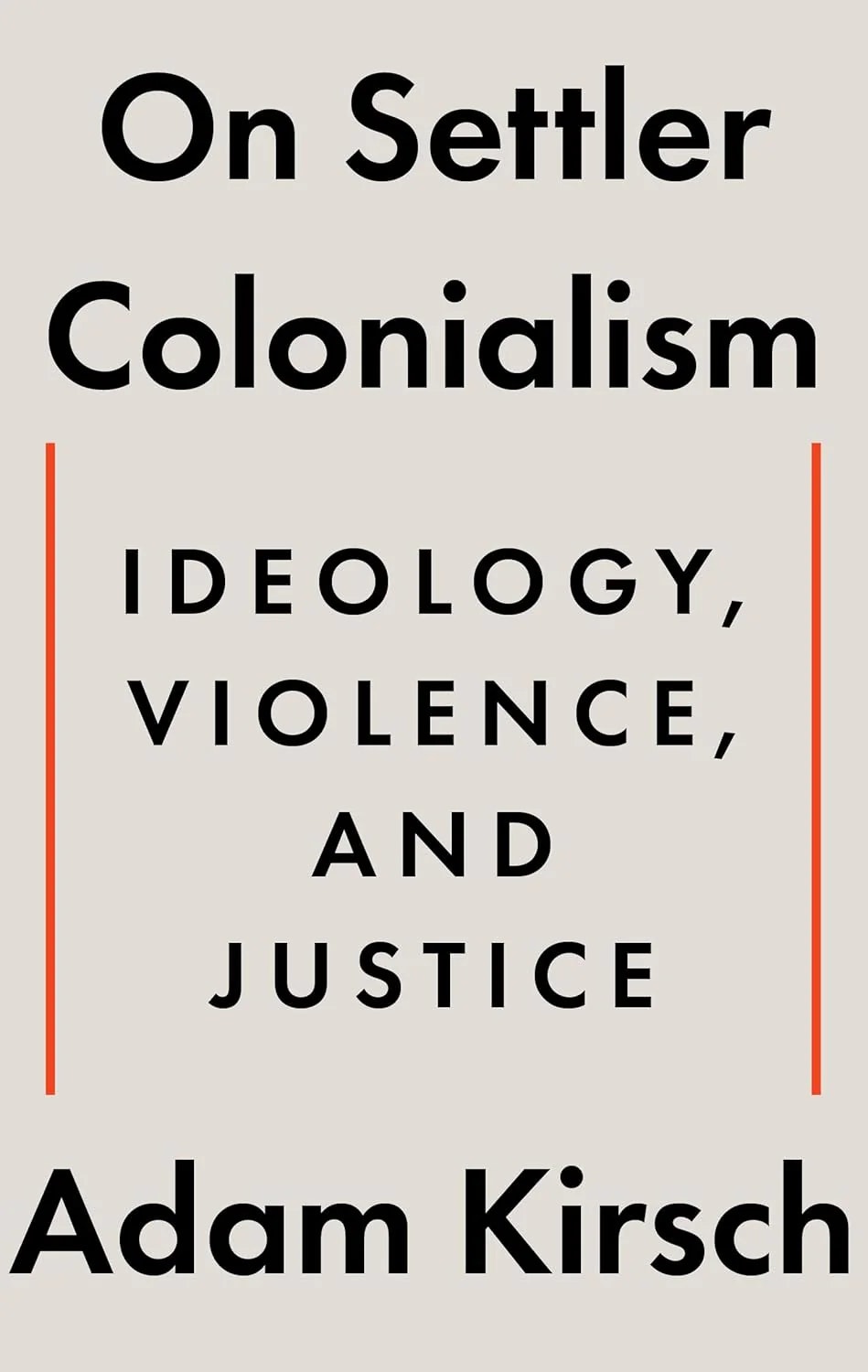In a letter penned in 1931, C.S. Lewis described Christianity as “simply a true myth.” His axiom cleverly disarmed a favoured atheist claim: that truth and myth belong to separate, and even contradictory, spheres.

Mythological beliefs are enjoying a resurgence. Recent decades have seen a new kind of apologist, full of passion for a particular kind of story about human history and destiny. The myth might be called salvation by means of social justice. In On Settler Colonialism: Ideology, Violence, and Justice (2024), the American columnist Adam Kirsch casts a calm, clear light on “settler colonial studies”: a social justice sect whose adherents have been distinctly un-calm since 7 October 2023.
Within hours of Hamas’ appalling attack on Israeli civilians, the “settler colonial” paradigm inserted itself into public commentary. In this slim and approachable monograph, Kirsch leads readers into the topsy-turvy world of this academic theory. Zareena Grewal, an Associate Professor at Yale, phrased it with helpful candour on X: “Israel is a murderous, genocidal settler state and Palestinians have every right to resist through armed struggle” (3). How did this phrase come to be used by scholars and students in the most prestigious universities of the West to rationalise the slaughter of Jewish Israelis in their homes and at music concerts?
Kirsch traces the settler colonial idea back to its origins in the post-war mid-twentieth century, when a significant portion of the global population still lived under colonial rule “and their overlords, in most cases, were the very Allied powers that had just fought a war in the name of self-government.” (16). The decades that followed saw the decolonisation process in much of what was the British Empire and French-occupied Indochina and North Africa. This set off not only a political but an intellectual revolution that deconstructed and critiqued the power structures of colonial empires.
Kenneth Good used the term settler colonialism in the 1970s to differentiate somewhere like Vietnam — where French colonial governors had made up 0.17 per cent of the population — from countries like South Africa, Algeria, and Rhodesia where the governing populations had settled in large numbers. In the United States, Canada, Australia, and of course, Israel, the original colonial population was so extensive that, over time, they became majorities. Describing them as settler colonial societies, in Kirsch’s words, “is a way of arguing that they are permanently illegitimate, because they were created against the will of the people previously living there” (x).
This quality of perpetual illegitimacy is one key principle of settler colonialism, epitomised by Australian theorist Patrick Wolfe who argued, “Invasion is a structure, not an event” (7). Rather than one episode in the history of a country, conquest becomes an indeterminate structure of oppressive displacement that persists in the bones of today.
Like other critical theories, settler colonialism wants to build an unbroken continuum from then to now, so that understanding our past becomes inextricable from destabilising our present. Reflection on past injustice leads irrevocably to “interrupting, dismantling, and refusing ‘settler futures’ – that is, futures in which settler colonial societies like the United States and Israel continue to exist” (11).
This darkness-to-light historical narrative and ever-receding promise of a Great Decolonial Reckoning amounts less to a social theory, Kirsch argues, and more to a new theology. “It attributes many different varieties of injustice to the same abstraction and promises that slaying this dragon will end them all” (13).
In highlighting the religious fervour of social justice movements, Kirsch is not alone. French philosopher Jean-François Braunstein argued along similar lines in La Religion woke (2022). In Woke Racism (2021) Columbia professor John McWhorter sees antiracism as a religion for America’s Left. An “elect” few regard themselves as “bearers of a Good News that, if all people would simply open up and see it, would create a perfect world.” In the UK, philosopher John Gray identifies what he calls “hyper-liberal ideology”, operating as “the anti-Western creed of an antinomian intelligentsia that is ineffably Western.”
Elitist intellectual discourse is put to work undoing the very societies that gave rise to it
As for apocalyptic sects, so for hyper-liberal ones. Both the supposed depravity of the original sin, and the promise of the purgative end times, are the products of cognitive contortions and linguistic manipulation characteristic of the educated West. Elitist intellectual discourse is put to work undoing the very societies that gave rise to it. With further irony, in settler colonial ideology’s effort to deconstruct and replace previous knowledge and stories, it enacts a plunder of its own, not dissimilar to the original ransacks it decries.
The word “genocide” is a case in point. Kirsch cites Damien Short of the University of London, noting that these days “it isn’t actually necessary for anyone to be killed in order for genocide to take place” (26). Co-founder of the journal Settler Colonial Studies Lorenzo Varancini broadens genocide with the impenetrable phrase “transferist imagination”, describing describe twenty four cultural and metaphorical (i.e. non-physical) ways in which indigenous peoples are transferred out of their native land towards extinction. One of these, “transfer by assimilation”, might be called a step towards peaceful, multicultural coexistence. Varancini interprets it as a defeatist eradication of native identity.
The great irony here, as Kirsch observes, is that “turning a myth upside-down only produces a different myth” (50). They decry the story of Western triumphalism, and instead write a new story: one in which the complexity, agency, and autonomy of native peoples are flattened and replaced by the perpetual purity of the victim.
And Palestine is the victim par excellence. If Kirsch calmly points out that China’s treatment of the Tibetan or Uighur people fits more squarely into Wolfe’s and Veracini’s own definitions of settler colonialism than does Israel’s relationship with Palestine, then he also lays out the reason that he is unlikely to be listened to: the unyielding commitment of those who insist that “the only way to think about injustice, or even about basic historical phenomena like war and conquest, is by analogy with Palestine” (84).
Keeping Palestine as the ultimate locus of injustice involves a number of notional, historical, and linguistic acrobatics that settler colonial theorists are happy to perform. For instance, “If Israel is a settler colonial state, and settler colonialism entails genocide, then it is ideologically necessary for Israel to be committing genocide”, write Kirsch. Hence the redefinition of the term, which allows theorists to transform “the Jews, the exemplary modern victims of that crime … into its perpetrators instead” (93). A perfectly landed cartwheel.
“Indigeneity” must be similarly contorted because “recognizing Jews as aboriginal to the land of Israel would turn one of settler colonial studies’ key rhetorical weapons against itself.” Thus, “it simply declines to engage with this idea and its implications”, acknowledging only the nineteenth and twentieth-century history of the region (91).
Not all myths are created equal. Lewis’ “true myth” was Christianity, which insists on universal moral accountability. Christ collapsed the category of oppressor and oppressed beyond recognition. Instead, he asserted the humanity of every single person, possessed of both sinfulness and redemptive potential. The promise of the Christian myth is one in which no one has to remain a perpetual victim of wrongdoing: forgiveness and new life are hard won, but real possibilities.
Kirsch offers a clear and accessible critique of a theory that does not always name itself, but is widely in evidence in our media. Some may criticise the thinness of the book. But if he makes light work of outlining the heavy historical events in Israel and Palestine, it casts a spotlight in the way that turgid language and obstinate, endless historical debate have landed the region in a despairing state of stasis.
By exposing the ironies, hypocrisies and evasions of settler colonial theory Kirsch does not aim to offer a complete picture of how geopolitics should proceed in the 21st century. He does aim to help us think carefully about the dangers of an ideology that seems determined to usher in an age not of reconciliation or hope, but of division and despair.







